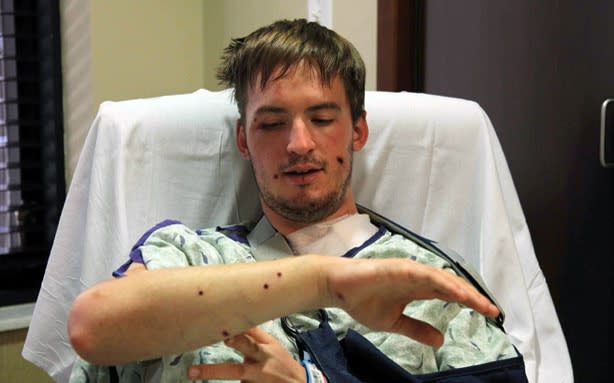Aurora Shooting Victims Hurt by Lack of Health Insurance

The Aurora theater shooting has spurred new debates about gun control laws in America, but could it also play a role in the ongoing health care debate? Three of the five hospitals that treated victims of the shooting say they will limit or even forgive medical bills for patients who were wounded in the attack, many of whom are still being treated. Most of the wounded are expected to have medical costs in the hundreds of thousands, if not millions, of dollars and many appear to have inadequate or non-existent coverage.
RELATED: Health Secretary Knocks WSJ—in the WSJ
Some people have already been quick to point out that the hospitals wouldn't need to forgive those costs, if President Obama's health care reforms had already taken effect and everyone involved was already covered by health insurance. It was just last month that the Supreme Court issued its major ruling on the constitutionality of the individual insurance mandate, which is part of the health care reform law that many in the Republican party still hope to repeal. That mandate was specifically created to avoid scenarios like this one, when an otherwise healthy, but uninsured person receives a potentially catastrophic injury.
RELATED: Reid's Race Card
Most of the wounded victims are single and under 35, the part of the population most likely to not have their own insurance. Even if they do, it might not be adequate to cover all of their costs, particularly the extensive rehabilitation and post-hospital treatment that most of them will probably need. One of the victims, Caleb Medley, remains in coma and his wife also gave birth to their first child on Tuesday. However, Medley is uninsured and their family medical expenses have been estimated to be in excess of $2 million.
RELATED: Obesity Wars: Huckabee Sides with Michelle Obama Over Palin
The hospitals have not released information about which patient may or may not be covered, but over 1.5 million Colorado residents are uninsured or under-insured. The two hospitals that didn't announce a plan to forgive bill already provided more than $750 million in free care every year, as two of the state's biggest "safety net" hospitals. Several different charity funds have established to help the victims, but it's not clear how much they will cover and it also underscores another uncomfortable issue — what about all the people who aren't injured in a major, highly public tragedy? There are many, many other Americans who don't get relief funds or have their medical bills forgiven when things go wrong.
RELATED: What's Behind The Wave of Right-Wing Health Care Violence?
We haven't yet seen any politicians try to use this incident as a talking point in the debate over health care, even though it would be more likely to have an impact in that arena than the otherwise stalled gun control argument. This is exactly the kind of story that highlights the importance of a well-maintained health insurance system, yet the dialogue still seems to be concentrating on stopping the shootings, and not what happens after.

